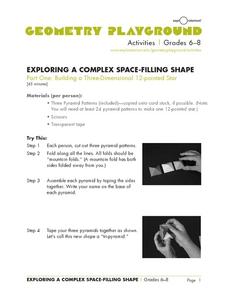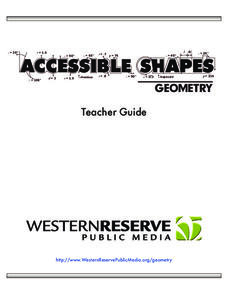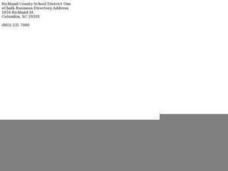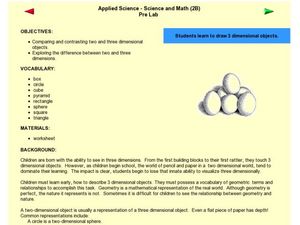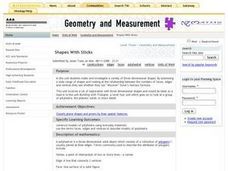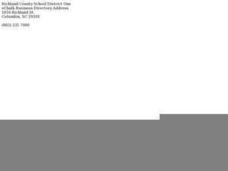Curated OER
Shape Hunt
Students explore two-dimensional and solid shapes. In this shapes and patterns geometry lesson, students work with a partner to create identifiable objects using tangrams. Students describe the attributes of their shape and their partner...
Mathematics Assessment Project
Representing 3-D Objects in 2-D
How does the shape of the surface of water in a container change as water leaks out? After tackling this question, learners take part in a similar activity with more complex figures.
Exploratorium
Exploring a Complex Space-Filling Shape
Middle schoolers build a three-dimensional 12-pointed star as a geometric exercise. The shape is quite-difficult to construct. Luckily there is an excellent template that learners cut out, then use to make their pyramid. The second part...
Curated OER
Lesson 2: Shapes
Shapes are really neat, and here's a lesson that will help learners identify shapes through song, touch, and sight. They sing a shape song as they bounce different shapes around in a parachute. They then read a story and feel each shape...
Charleston School District
Volume of Composite Shapes
It's the parts that make the whole. Learners apply volume formulas to composite figures to find the total volume of the figure. Previous lessons in this series taught the methods for finding the volume and/or dimensions of...
PBS
Accessible Shapes
All the 2-D and 3-D measurement work you need is in one location. Divided into three sections, the geometry lesson plans consist of visualization of three dimensions, classifying geometric figures, and finding surface area and volume....
Space Awareness
What is a Constellation
Why do some stars in a constellation appear brighter than others? Using a get-up-and-move astronomy activity, scholars explore perspective and the appearance of constellations in the sky while developing an understanding of the...
Mathed Up!
Nets, Plans, and Elevations
A dimensional resource teaches viewers to recognize 2-D views of 3-D objects and how to match nets with their 3-D figures. Individuals draw different views of three-dimensional objects including views from the front, side...
Curated OER
Investigating Shapes in Our World
First graders explore shapes. In this geometry lesson, 1st graders make shapes with geo-boards, use play-dough to make three-dimensional figures, and make a shape book using pre-cut shapes.
Curated OER
One Good Turn Deserves Another
Students make observations about shapes and 1-, 2-, and 3-dimensional objects. They conduct observations and make predictions regarding transformations of simple geometric shapes. They identify shapes that occur in household items.
Curated OER
Great Shapes Alive!
Compare two- and three-dimensional shapes and construct three dimensional models from two-dimensional shapes. Diagram the shapes and reflect about the process in writing.
Curated OER
Shapes
Fifth graders explore shapes. They recognize and name two-dimensional and three-dimensional shapes. Pupils discuss the properties and criteria for each shape they find in real life and construct a Kid Pix project using pictures of the...
Curated OER
Shapes Around Us
Students identify basic two-dimensional shapes. They are able to identify the four basic two-dimensional shapes: squares, rectangles, triangles, and circles. Students write/draw in their learning logs a reflection of what they noticed...
Curated OER
Draw 3 Dimensional Objects
Bring three-dimensional shapes to life in your classroom. First introduce the vocabulary of three-dimensional shapes, such as sphere, cube, and pyramid. Then, show your kids examples of how to use two-dimensional objects draw...
Curated OER
3-D Figures Part 1
Elementary schoolers explore 3-D shapes. They transition from thinking of shapes as only 2-D. Pupils read Cinderella as a launching activity for their upcoming adventure, and explore a new world of 3-D shapes in this introductory...
Curated OER
Shapes: Art or Geometry
Budding artists or mathematicians read about,and then draw, two very different shapes. Geometric and organic 2-D shapes are defined. Learners use the definitions to draw examples of each.
Curated OER
Three Dimensional Figures
In this geometry worksheet, students study diagrams with labels of common geometric figures. Students then answer 24 questions. Then they draw and label their own figures.
Curated OER
Guess My Shape
Learners play a game with shapes. They work in groups to identify the names and characteristics of various shapes. They give each other clues to see if others can identify the shape being described. This is a great hands on activity.
Curated OER
Ocean Exploration: Shapes and Patterns Under the Sea
So many shapes in our vast oceans. Young explorers can discover new shapes in a variety of ways in this lesson. One way is having free exploration with a pattern shape kit handed out by the teacher. Another is by viewing a...
EngageNY
Cones and Spheres
Explore methods for finding the volume of different three-dimensional figures. The 20th lesson in the 25-part series asks learners to interpret diagrams of 3-D figures and use formulas to determine volume. Scholars must use the...
Curated OER
Children's Museum of Houston - Pre/Post Classroom Activities - Nets
Students make three dimensional shapes with nets. In this nets lesson, students receive nets which they fold to make a three dimensional object. They predict what shape each net will make and verify it after making the net. They use the...
Curated OER
Shapes with Sticks
Third graders investigate three dimensional shapes. They examine a variety of shapes and the relationship between the number of faces, edges, and vertices. Students determine Euler's formula and they create a variety of three dimensional...
K12 Reader
3-D: It’s Not Just for Movies
This two-part reading comprehension exercise asks kids to read a short passage about cubes, rectangular prisms, spheres and pyramids, and then to respond to a series of questions about the article.
Curated OER
Roll or Slide?
Students explore models of three-dimensional shapes. In this geometric shapes lesson plan, students use hands-on manipulatives to explore three-dimensional shapes. Students predict whether each shape will roll or slide.




